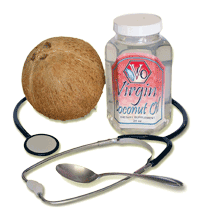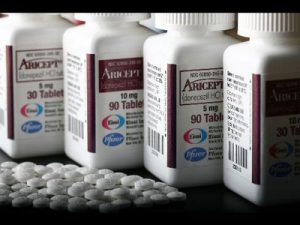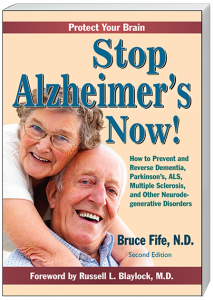 Alzheimer's is an ugly disease. Few other diseases can elicit the fear and sense of hopelessness that comes with a diagnosis of Alzheimer's. Ever since it was first identified by Dr. Alois Alzheimer in 1906 there has been little hope for those who have the disease.
Alzheimer's is an ugly disease. Few other diseases can elicit the fear and sense of hopelessness that comes with a diagnosis of Alzheimer's. Ever since it was first identified by Dr. Alois Alzheimer in 1906 there has been little hope for those who have the disease.
The gradual decline in mental function associated with Alzheimer's often begins with barely noticeable lapses in memory followed by losses in the ability to plan and execute familiar tasks, and to reason and execute judgment. Eventually, memory loss increases in severity until it is incapacitating. The ability to articulate words correctly and changes in mood and personality may also be evident. Emotional problems such as easy agitation, poor judgment, mental confusion, feelings of withdrawal, disorientation, and hallucinations are common. Affected individuals may also develop seizures and incontinence, requiring constant attention and care. Death is the final outcome. Alzheimer's is the seventh leading cause of death in the United States.
Alzheimer's usually surfaces sometime after the age of 60. The disease affects 1 in 8 people over the age of 65 and affects nearly half of those over 85. In a small number of people it occurs in their 40s or 50s.
People with Alzheimer's disease live an average of eight years from the time of diagnosis, but the interval can be as short as one year or as long as 20. The duration of the disease depends, in part, on age at diagnosis and the presence of other health problems.
The incidence of Alzheimer's is growing rapidly. In 1979 the disease affected only about 0.2 people out of every 100,000. By 2006 that number shot up to 20 per 100,000. Incidence is expected to double over the next 20 years.
Alzheimer's is not a normal process of aging; it is a disease. While genetic susceptibility is believed to affect about 5 percent of cases, Alzheimer's is caused primarily by environmental and lifestyle factors. Those who have parents, grandparents, or siblings who are affected by Alzheimer's are at increased risk themselves, not because of genetics, but due to a shared environment or learned habits that promote the disease.
A study of elderly couples found that where one partner has dementia, the other is six times more likely to develop the condition.1 This suggests that something in the couple's shared environment, rather than genetics, is the primary cause of the disease. If you have a family member who has Alzheimer's, you are at increased risk.
Over the years researchers have identified many factors that promote Alzheimer's disease. The most significant of which are poor diet, traumatic head injury, stroke, taking certain drugs, chronic stress, environmental toxins (pesticides and toxic waste), toxic metals (mercury and aluminum), and infections. Although excessive exposure to any one of these factors can lead to Alzheimer's, the disease usually results from a combination of factors over an extended period of time.
Each one of these factors promotes chronic inflammation and excessive oxidative stress (too many free radicals) and interferes with normal glucose metabolism thus blocking the brain's ability to convert glucose into energy. Without adequate energy, neurons—our brain cells—weaken. Sick and dying neurons are unable to withstand the stress of chronic inflammation and the constant assault of damaging free radicals. As a result, neurons die, the brain shrinks, and cognitive skills are lost. The greater the exposure to the above factors, the faster the mental decline.
Alzheimer's is a terminal illness. The brain is the most important organ in the body. It controls the function of all our other organs. We can survive without some organs, such as the appendix or tonsils, but some organs are so vital to life we cannot exist without them. If we experience kidney failure, we die. If we experience heart failure, we die. When the brain fails, it affects the heart, kidneys, and all other organs and we die. Alzheimer's eventually leads to brain failure.
Alzheimer's is not just a concern for the elderly. There is no way of telling who will develop the disease. We are all at risk. Alzheimer's doesn't happen suddenly; it is a progressive disease that begins decades before the first symptoms surface. The conditions that eventually lead to Alzheimer's may start as early as the teenage years or before. As a person ages, brain cells die at an accelerated rate. The brain's natural ability to compensate for lost neurons masks the problem until there are too few remaining to maintain normal brain function. By the time symptoms become noticeable, approximately 70 percent of the brain cells responsible for memory are already destroyed. At this stage, full recovery is impossible.
Currently there is no effective medical treatment for the disease. A diagnosis of Alzheimer's is essentially a death sentence. Treatment focuses on reducing the severity of the symptoms, combined with providing services and support to make living with the disease more manageable. Patients must endure the disease through all stages of degeneration until the bitter end.
Aricept the most widely prescribed drug for Alzheimer's at best might slightly ease some of the symptoms but this is debatable, since the results are so subtle it isn't clearly evident. Even if the benefit were tiny, it might be better than nothing at all, except the side effects can be devastating. Dozens of side effects have been reported including nausea, diarrhea, insomnia, headaches, generalized pain, and death.
There is little that can be done using conventional medicine. Doctors don't have a clue how to stop or even prevent this destructive disease. "That's unusual for a disease of this magnitude." says Robert Egge vice president of public policy at the Alzheimer's Association. "Right now, we're standing with no good therapeutic options to change the course of this disease."
That statement doesn't sound very promising. Fortunately, however, there is a way to both prevent and reverse Alzheimer's. It doesn't require drugs, surgeries, radiation, high tech medical devices, or psychiatric treatment. The solution is in the diet.
The fundamental problem associated with Alzheimer's disease is the inability of the brain to effectively utilize glucose, or blood sugar, to produce energy. This defect in energy conversion starves the brain cells and weakens their ability to withstand stress. As a result, the brain rapidly ages and degenerates into dementia.
The solution to the problem is to restore the brain's ability to produce the energy it needs to resist stresses that harm the brain, enable it to repair damage, and stimulate growth of new cells. At one time, it was believed that we could not regenerate new brain cells.
The brain cells we were born with, scientists thought, had to last an entire lifetime. When brain cells died, they were gone forever. Recent research has shown that this is not true. The brain can and does generate new cells even in old age.2
The carbohydrate in the foods we eat is converted by the body into glucose. Glucose is the body's primary source of fuel. Cells take glucose and transform it into energy—the energy they need to live and function.
When food is not eaten for a time, such as between meals, during sleep at night, or when fasting, blood glucose levels fall. To maintain the energy needed by the cells, fatty acids (fat molecules) are released from our fat cells. Like glucose, fatty acids can be burned to produce energy. Energy is supplied by either glucose or fatty acids. This process works well for the body, but not the brain. The brain cannot use fatty acids to satisfy its energy needs.
The brain is the most metabolically active organ in the body. It requires a continual source of energy to maintain function, even during sleep. Although the brain accounts for only about 2 percent of an adult's body weight, with every beat of the heart about 25 percent of the blood goes to the brain. Any interference in delivery of energy can seriously hamper brain function.
When blood glucose levels fall, the brain needs another source of energy to function and to survive. This alternative fuel source comes in the form of ketone bodies or ketones. Ketones are a special type of high-energy fuel produced in the liver specifically to nourish the brain. Ketones are produced from fat stored in the liver. Under normal conditions, we have very few ketones circulating in our blood, but as blood glucose levels decline, ketone production increases. This way the brain has a continual supply of either glucose or ketones to rely on.
In Alzheimer's disease, brain cells have difficulty metabolizing glucose, the brain's principal source of energy. Ketones bypass the defects in glucose energy metabolism associated with Alzheimer's. Therefore, if enough ketones were available on a continual basis, they could satisfy the brain's energy needs. However, ketones are only produced when carbohydrate consumption is very low; this normally happens when little or no food is being consumed.
Obviously, fasting is not a practical solution. However, if carbohydrate consumption is very low, a person can get all the calories and nutrients he or she needs from protein and fat. This type of diet is known as a ketogenic diet. The ketogenic diet has been used therapeutically for over 90 years to treat another brain disorder—epilepsy. Years ago it was discovered that fasting, consuming nothing but water, for several weeks at a time could significantly alleviate symptoms and in many cases completely cure epilepsy. The reason for this is that during the fast, ketones supply the brain with a more efficient source of energy than glucose, stimulating healing and the growth of new brain cells. Researchers reasoned that if they could prolong the effects of fasting for more than a few weeks, say for a year or so, it would allow more time for the healing process and increase the cure rate. Of course, you could not place someone on a fast for a year, so they devised a diet that mimicked the metabolic effects of fasting while providing all the nutrients needed to maintain good health. The result was the ketogenic diet. The ketogenic diet proved to be enormously successful even for very severe drug-resistance cases of epilepsy.
Since the ketogenic diet had proven so successful in correcting the brain defects associated with epilepsy, researchers began to wonder if it could be used to treat other brain disorders, such as Alzheimer's.
Initial studies with neurodegenerative disorders such as Parkinson's disease, ALS, Huntington's disease, traumatic brain injury, and stroke have shown that the ketogenic diet can provide symptomatic relief to a broad range of brain disorders.3-6 Animal models of Alzheimer's have also responded well to ketone therapy. In animal studies ketones are shown to reduce the amount of Alzheimer's-like plaque that forms in the brain and increase performance on visual-spatial memory tasks, increase the ability of learning tasks, and increase performance in short-term memory.7-8
With the classic ketogenic diet carbohydrate intake must be kept very low (around 2 percent of calories) in order to stimulate the liver to convert fat into ketones. Carbohydrate ordinarily accounts for about 60 percent of our daily calories. When this is dropped to only 2 percent, the void must be filled by other energy producing nutrients, either fat or protein. In the ketogenic diet fat is used to replace the carbohydrate in order to supply the needed building blocks for ketone production. Although the ketogenic diet shows great promise in treating Alzheimer's and other neurodegenerative diseases, producing palatable meals consisting of 90 percent fat is a challenge.
Fortunately there are certain fats, namely medium chain triglycerides (MCTs), that are converted into ketones in the body regardless of blood glucose levels or the amount of carbohydrate in the diet. When MCTs are consumed, a portion will be converted into ketones regardless of what other foods are eaten. Therefore, most any type of diet can be transformed into a ketogenic diet by the addition of an adequate amount of MCTs.
The addition of MCTs into the diet can produce very positive effects on the brain, providing a new tool with which to fight Alzheimer's. In clinical studies MCTs have produced better results in Alzheimer's patients than any other treatment currently known to medical science.
In one study for instance, Alzheimer's patients consumed a beverage containing MCTs or a beverage without MCTs. Those who drank the beverage containing the MCTs had markedly increased blood ketone levels after 90 minutes when a cognitive test was administered. These patients scored significantly better on the test than those who had not consumed the MCTs.9
This study was remarkable for the reason that it produced improvement in cogitative function after a single dose of MCTs. No Alzheimer's drug or treatment has ever come close to achieving results like this. Based on studies such as this, a new drug consisting of only MCTs has been approved by the FDA for the treatment of Alzheimer's disease.
MCT-based drugs aren't really necessary. They are expensive and require a prescription. Any source of MCTs can work just as well. The normal way we get MCTs is in our diet. However, there are few good natural dietary sources of MCTs. By far the largest natural source of MCTs is found in coconut oil. Coconut oil is composed predominately of MCTs, amounting to about 63 percent of the total. The MCTs used in Alzheimer's studies and to produce pharmaceuticals comes from coconut oil. The amount of MCTs in coconut oil is great enough to produce therapeutic blood levels of ketones. Two tablespoons of coconut oil can produce enough ketones to have a significant effect on brain function and can be used for the treatment of Alzheimer's.
Mary Newport, MD proved that coconut oil alone or in combination with MCT oil can effectively stop the progression of Alzheimer's disease and reverse the symptoms. Her husband Steve, suffered from the disease for nearly six years before he began taking coconut oil. The results were immediate and dramatic.

Any drug that could do half of what coconut oil does, and without any harmful side effects, would be the best selling drug in the world.
Prior to taking coconut oil he was diagnosed with moderately severe Alzheimer's. He could no longer take care of himself. He required supervision to complete many day-to-day tasks such as replacing a light bulb, vacuuming, doing a load of laundry, washing dishes, and dressing appropriately. He was easily distracted when attempting such tasks, and never got around to completing them. He was no longer able to use a computer keyboard or calculate or perform basic arithmetic. He often wore just one sock or shoe and misplaced the others. He was unable to read because words seemed to move about the page erratically, he had difficulty spelling simple words, such as "out" and "put" and had trouble recalling many common words when speaking. He had physical difficulties as well, including a moderate hand tremor that interfered with eating and a jaw tremor that was most apparent while speaking. He walked slowly with an abnormal gait which involved pulling each foot up higher than usual with each step. An MRI showed significant loss of brain mass particularly in the areas involved in memory and cognitive abilities. Drugs such as Aricept, Namenda, and Exelon proved to be of no help.
After taking coconut oil, his scores on Alzheimer's rating scales improved dramatically. Within just a couple of weeks his score on the Mini Mental Status Exam, a standard test for Alzheimer's, went from a low of 12 out of 30 to 18. A very significant improvement, which is unheard of since Alzheimer's is a progressive disease that doesn't get better over time. It always gets worse. His score continued to improve, elevating him from moderately severe up to a mild stage of Alzheimer's.
His memory has improved dramatically. He can recall events that happened days or weeks earlier and relays telephone conversations accurately. He is more focused when performing tasks and is able to complete household and gardening chores with minimal to no supervision. He now wears both shoes and socks and keeps the pairs of shoes together. His ability to initiate and continue a conversation has improved and his sense of humor has returned. He has regained his ability to read and the ability to type. His facial tremor is gone with minimal to no hand tremor. He walks with a normal gait and can run for the first time in more than a year.
He has improved so significantly that he now volunteers twice a week at the hospital where his wife works, helping in the warehouse and delivering supplies. He is pleased with his job and enjoys the people with whom he works. He continues to improve. With a smile on his face he exclaims "I've got my life back." Other Alzheimer's patients who are incorporating coconut oil into their diets are experiencing similar improvements.
Who could have imagined that such a simple dietary intervention could produce such a remarkable effect on brain health? The simple act of adding coconut oil into the diet can both prevent and treat Alzheimer's disease. For treatment purposes a total of 5 tablespoons (74 ml) a day taken with meals is recommended. Add a portion of the coconut oil to each of the three meals consumed during the day. For prevention, take 2-3 tablespoons (30-44 ml) daily.
Anybody can develop Alzheimer's disease at any time. You need not wait until symptoms surface before you start to do something about it. The old saying "an ounce of prevention is worth a pound of cure" is definitely true when it comes to neurodegeneration. You can stop Alzheimer's disease before it has a chance of taking over your life. Adding coconut oil into your daily life can provide that protection.
The use of ketones, either through a ketogenic diet, MCTs, or coconut oil, for the treatment of neurological and other disorders is known as ketone therapy. Researchers suggest that ketone therapy offers the most promising form of treatment for not only Alzheimer's and epilepsy but for a number of neurodegenerative disorders including Parkinson's disease, amyotrophic lateral sclerosis (ALS), Huntington's disease, and multiple sclerosis.
While adding coconut oil into the diet can have a remarkable effect on brain health, ketone therapy alone is not the complete solution. Diet also affects brain health. What you eat can either enhance the effectiveness of ketone therapy or interfere with it. An improper diet can sabotage the beneficial effects produced by ketone therapy. This explains why some Alzheimer's patients who add coconut oil into their diets experience remarkable improvement while others see only modest improvement.
The best diet for the brain isn't necessarily the typical "healthy" diet recommended by weight loss gurus and fashion magazines. It's a therapeutic diet—a diet that is designed to enhance brain health.
Combining ketone therapy with a proper diet can stop Alzheimer's dead in its tracks and bring about substantial improvement. My new book Stop Alzheimer's Now! provides details on how to use coconut oil along with a proper diet to successfully combat Alzheimer's and other neurodegenerative disorders.
Can Alzheimer's be prevented? Can it be cured? The program outlined in this book is designed to provide the brain with all the nutrients necessary to quiet chronic inflammation, stop free-radical destruction, energize the brain cells, and stimulate repair and growth of new brain cells; thus allowing the brain to heal itself. Yes, there is now hope for Alzheimer's. ■
by Dr. Bruce Fife
is now available from Piccadilly Books, Ltd.
References
- Roan, S. Dementia in one spouse increases risk in the other. Los Angeles Times May 5, 2010.
- Eriksson, P.S., et al. Neurogenesis in the adult human hippocampus. Nat Med 1998;4:1313-1317.
- Tieu, K, et al. D-beta-hydroxybutyrate rescues mitochondrial respiration and mitigates features of Parkinson disease. J Clin Invest 2003;112:892-901.
- Gasior, M., et al. Neuroprotective and disease-modifying effects of the ketogenic diet. Behav Pharmacol 2006;17:431-439.
- Zhao, Z., et al. A ketogenic diet as a potential novel therapeutic intervention in amyotrophic lateral sclerosis. BMC Neuroscience 2006;7:29.
- Duan, W., et al. Dietary restriction normalizes glucose metabolism and BDNF levels, slows disease progression, and increases survival in huntingtin mutant mice. Proc Natl Acad Sci USA 2003;100:2911-2916.
- Van der Auwera, I., et al. A ketogenic diet reduces amyloid beta 40 and 42 in mouse model of Alzheimer's disease. Natr Metab (Lond) 2005;2:28.
- Costantini, L.C., et al. Hypometabolism as a therapeutic target in Alzheimer's disease. BMC Neuroscience 2008;9:S16.
- Reger, M.A., et al. Effects of beta-hydroxybutyrate on cognition in memory-impaired adults. Neurobiol Aging 2004;25:311-314.
_______________________
 Can Medications Control Alzheimer's?
Can Medications Control Alzheimer's?
According to the Alzheimer's Association, "At the present time, there is no treatment to cure, delay, or stop the progression of Alzheimer's disease. FDA approved drugs temporarily slow worsening of symptoms for about 6 to 12 months, on average, for about half of the individuals who take them."
The average time a person with Alzheimer's lives after being diagnosed is eight years. Drug treatment is only beneficial for 6 to 12 months, and ac-cording to the Mayo clinic the effect is "modest" at best and only half of the people who take the drugs experience any benefit.
The most prescribed drugs for Alzheimer's are Aricept (donepezil), Razadyne (galantamine), and Exelon (rivastigmine). These drugs do not stop the progression of the dis-ease and cannot stop or even slow down the underlying destruction of the brain cells. Alzheimer's patients have low levels of a brain chemical believed to be important for memory and thinking called acetylcholine. These drugs work by blocking the action of an enzyme that breaks down acetylcholine. As Alzheimer's progresses, the brain produces less and less acetylcholine, there-fore, these drugs eventually lose their effect. The drugs are only recommended for early and moderate stages of Alzheimer's. They have no effect on later stages.
Even if the drugs provide a small benefit, isn't it worth it? You be the judge. Like all drugs, Alzheimer's medications are accompanied by some disturbing side effects. Reported side effects include: headache, dizziness, nervousness, hallucinations, depression, mental confusion, hostility, emotional instability, insomnia, generalized pain, hot flashes, bloating, sore throat, gastrointestinal bleeding, nausea, vomiting, diarrhea, incontinence, drooling, delusions, tremor, irritability, aggression, abnormal gait, muscle weakness, stroke, kidney failure, heart attack, and death.* Most of these symptoms are also common symptoms of Alzheimer's. So how can you tell which are caused by the disease and which are caused by the medications? What good is the medication if it causes the same symptoms as the disease? What good is a drug that is possibly only useful for 12 months at most, yet carries a risk of stroke, kidney failure heart attack and death? These are the best drugs medical science has at its disposal for the treatment of Alzheimer's. In other words, there is no effective treatment currently available.
*Aricept was approved by the FDA in 1997 and is the most prescribed drug used to treat Alzheimer's. A clinical study carried out in 2006 by Eisai Co. discovered that Aricept has a serious downside—increased incidence of death. Over 900 people with dementia enrolled for the drug trial. In the study 648 patients took Aricept once a day for 24 weeks and 326 received a placebo. Within the 24 week period 11 people died from the use of Aricept compared with no (zero) deaths in those treated with placebo. If the study had lasted for longer than just a few weeks, there would undoubtedly have been a much higher death rate. Interestingly, this study was never published in any of the medical journals.

